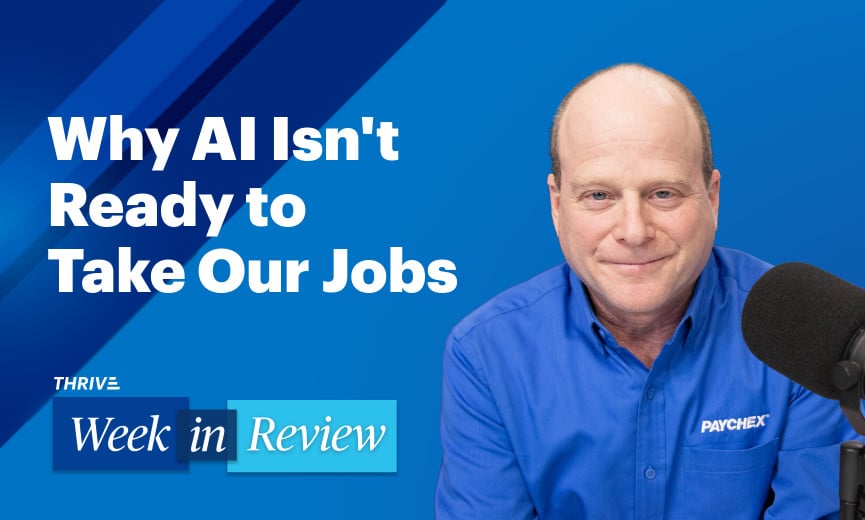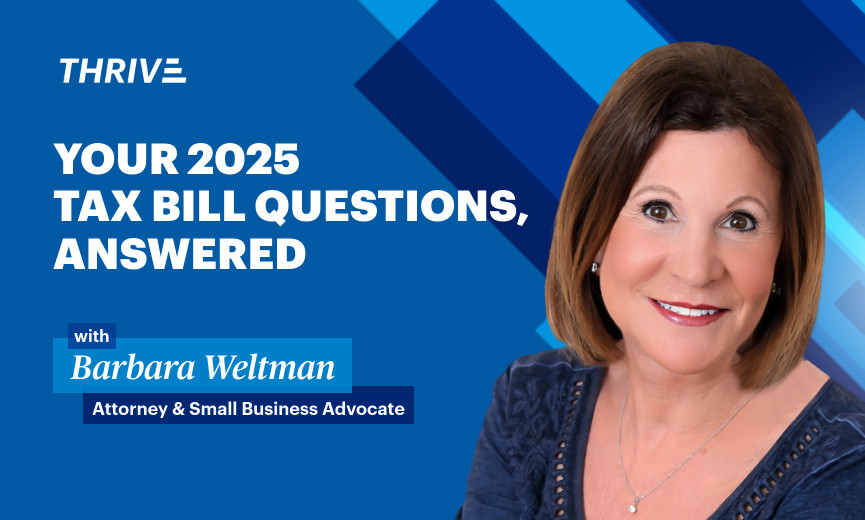- Thrive
-
Season
4Episode181
Soaring Healthcare Costs, FTC Non-Competes Ban, and Risk of BOI Reporting Fines
Podcast •
Watch
Summary
No employer wants to deal with a 9% spike on healthcare costs and no employee wants to share the brunt. Gene Marks suggests several options to mitigate the potential financial impact. He also catches everyone up on the latest with the FTC’s non-compete ban and current court decisions that could impact some businesses. And if required to file a Beneficial Ownership Information report, don’t wait. The fines are steep. Listen to the podcast for more details.
View Transcript
Hey everybody, it's Gene Marks, and welcome to this week's episode of the Paychex THRIVE Week in Review podcast. This is the podcast where we take a few items of news in the week that affects your small business and my small business, and we talk a little bit about that. So, let's go right to the news, shall we?
The first news report actually comes from FOXBusiness.com. They are reporting on a new survey that came out by Aon. Aon is a, a healthcare consulting firm. They surveyed hundreds of employers representing millions of employees and have come to the forecast that health insurance premiums or healthcare costs are going to go up about 9% in 2025 – 9%. That's like three times the amount of inflation.
Aon is not alone. There have been other studies, as well, from other groups that have also forecasted a similar increase, anywhere from 8 to 9% of our health care costs next year. So, as I'm recording this, we're in August and, you know, guys, we got to be ready for these healthcare increases. Now, there's not a lot we can do if we're dealing with the big healthcare insurance companies. And honestly, I want to talk to the people at Paychex: We should probably devote an entire episode to this with some advice.
But let me give you some quick advice, just so you know, okay? Many of my clients are offering multiple plans and offering a fixed amount of what they'll contribute so that employees can pick the right plans for them because they're finding that sometimes, if they only have one healthcare plan, a lot of their employees aren't using all the benefits of that healthcare plan.
So, the idea is to offer different plans and different costs, where employees can choose what makes the most sense for them. And in the long run, it could save money. So, that's number one.
Number two, many of my clients with high deductible plans have HSA accounts, health savings accounts. They're like a 401(k) for your health care. Your employees put money away pretax. They can then take the money out and use it for their on reimbursed medical expenses. It allows you to have higher deductibles on your plan because they're getting a break on some of those medical expenses.
Other clients are opening up HRAs – health reimbursement accounts. Those are also accounts that can be in many cases, in lieu of your existing insurance or along with your existing insurance. And here, with HRAs, the very simplified version; You, as the employer, are contributing money to their HRA and they're using that money to buy their own healthcare insurance, maybe on the healthcare exchanges, for example, or from an approved broker. That way you can better control your costs, as well.
Finally, I have been seeing a big rise in captive insurance programs, particularly for health benefits. It used to be that self-insurance was a big companies game. Now it is, it's changing a lot. So, you probably should Google for your state, your state name and captive insurance programs, and there will be organizations that have them. You can join one regionally or in your industry. That way you're pooling all of your expenses with a bunch of other like-minded companies.
Yeah, there is some risk, but the risk is usually mitigated by good management, and I have clients that are belonging to captive insurance programs, and they're saving a lot of money on their healthcare costs because of it.
So, again, offering many choices with the fixed contribution, offering HSAs, offering HRA is, checking out captive insurance programs. These are all ways, all strategies to try and minimize your healthcare exposure, where, as you saw by the news this week, healthcare costs are going up as much as 9% next year. So, that's the first time in revenues.
Let me move on to the next item of news. Now, this item is being reported on HRdive.com, but it's all over the place. It has to do with non-compete agreements. Now, if you remember, a few months ago, the Federal Trade Commission passed a ruling which basically made all non-compete agreements noncompliant, like, like, not existent anymore after August of this year.
That impacts a lot of businesses. They had specific reasons for doing this. You know, it, you know, reduces the competitiveness of employees to find work. Businesses were pushing back against it. And this week, one business group, who was pushing back against that? They sued the FTC in court, and they won.
Let me read this to you. “A Florida federal judge agreed to stay and enjoying the FTC's ban on non-compete agreements for a single company's employment contracts last week, joining a Texas federal court in blocking the FTC action ahead of its effective date, which is next month. The judge in Florida held it is substantially likely the FTC's ban presents a major question, as defined under the U.S. Supreme Court's Major Questions doctrine, due to the ban's potentially huge economic impact, among other factors.”
The judge also found that Congress did not render a sufficiently clear expression of legislative intent to authorize such a ban. So, right now, that FTC non-compete ban has been banned, but for that one company, it has not been banned across the board. It is not a, you know, a class action suit.
So, even though the FTC has been banned – and by the way, the FTC is considering an appeal and I'm sure this will ultimately wind its way up in the Supreme Court – as far as you're concerned, that ban on non-competes still applies to you and your company, which means that you really need to have a strategy for getting around that.
Let me give you some advice on non-compete. If the FTC is banning non-compete, they are not banning nondisclosure or privacy or confidentiality agreements. And let's face it, that's our biggest issue when somebody is leaving our company, right? They're going to leave our company and go to a competitor on the other side of town and bring our proprietary data with them.
Well, you know, if you can't stop them from doing that, at least leaving your company and working for a competitor, you can really step up your, nondisclosure and your confidentiality agreements with your employees to really make sure it is ironclad, clear that if they, use any, of your proprietary data, customer list, information from your company and, you know, get wind that that's being used as a competitor because of them, that would be a very, very big issue.
So, I just want to be clear; although non-compete agreements are still banned for just about every company, I mean, there's one company in Florida, and it might be overturned at some point, right now, it's in effect. It's fine. Just take the opportunity to really step up your non-disclosure – your NDAs, they’re called – or your confidentiality agreements and I think that will provide enough protection for you even if this ban stays in place.
The final news also comes from the government this week. And, this is actually, reported in the Greeley Tribune. I'm not sure where Greeley is. Might be one of the Carolinas, but I'm not really 100% sure. I'm looking for it here. Whatever! It's a nice article. It's on GreeleyTribune.com. GreeleyTribune.com, and it has to do with the FinCEN rules.
We've been talking about that business ownership rules, right? We have to disclose the, your major owners, the substantial owners in our businesses, and we have to do this by the end of the year. Now, in this report, some people are assuming that up to 94% of businesses have yet to file their reports.
And I got full disclosure for you, I haven't filed my report yet either, and I really need to do this. So, do you. Talk to your accountant or an attorney or go to the Treasury Department's website? Look for business ownership interest. Look for the Corporate Transparency Act. Lok for FinCEN, F-I-N-C-E-N, and you'll find it. It's an application or a form that you have to fill out that – what it does is it disclosures all of the beneficial owners of your company. It's not just the people that have ownership or people that had substantial control or decision making over your company.
And this is for all entities that usually or generally have less than 20 employees and less than $5 million a year in revenue. Now, there's other, you know, companies that are exempt from this, but it's really going after a lot of the subchapter S companies, the partnership companies, you know, people that have a lot of different entities; real estate firms, investment firms, whatever, where, the government is trying to find out the beneficial owners of these entities.
It's a security issue. I mean, this came from the Department of Homeland Security looking to make sure that, there's no terrorist there involved in the ownership of American companies. So, you have to file it. If you don't, you could be subject to fines of up to $10,000 per entity if you do not do this by the end of this year.
So, you got to do it. I strongly recommend you talk to an accountant. You talk to an attorney and make sure that you are not one of those 94% that's reported in the Greeley Tribune, say that they haven't filed these documents yet. We all need to be doing this.
My name is Gene Marks, and you’ve been watching and listening to this week’s episode of the Paychex THRIVE Week in Review. If you need any advice, tips or help in running your business, sign up for our THRIVE newsletter. You can get it at paychex.com/thrive.
Again, my name is Gene Marks. Thanks for joining. See you again next week for news that impacts your business and some thoughts on navigating that news. Take care
.
This podcast is property of Paychex, Inc. 2024. All rights reserved.

 Apple Podcast
Apple Podcast Spotify
Spotify iHeartRadio
iHeartRadio









